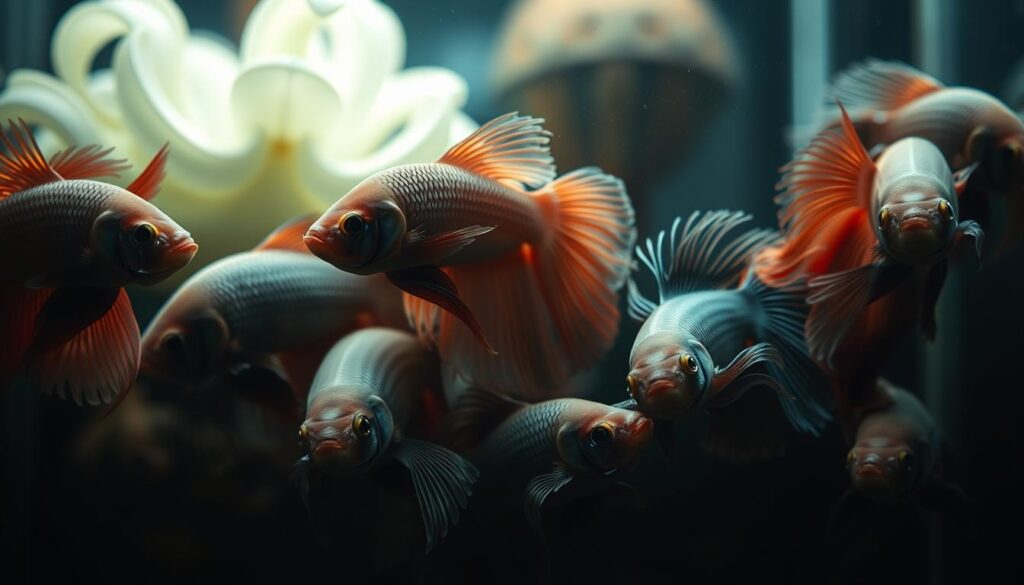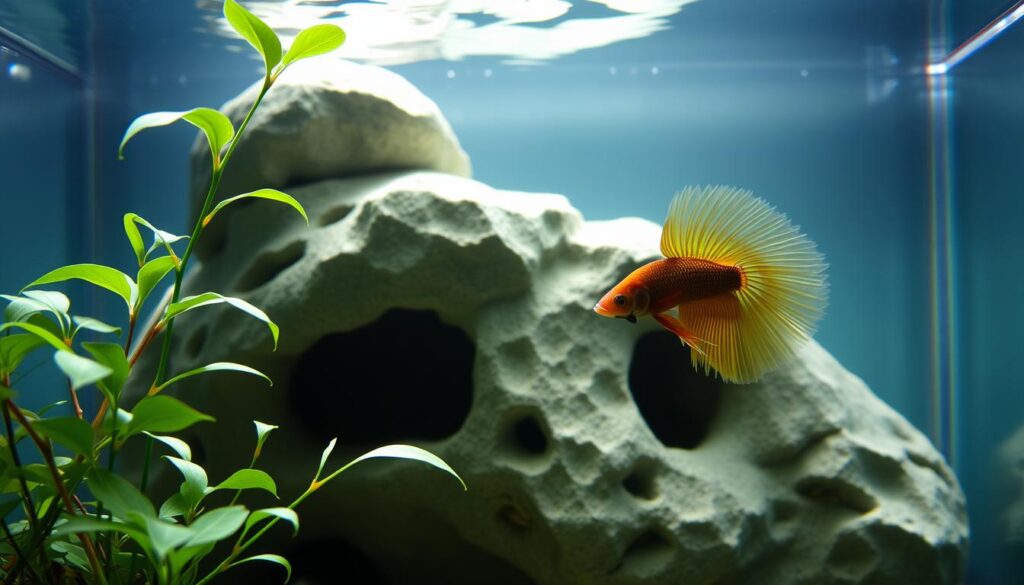Ever stared at your betta fish and wondered, “Is it sleeping or just being lazy?” Well, you’re not alone! Many fish keepers are curious about how long do betta fish sleep and what their rest looks like. Unlike us humans, betta fish have a unique and quirky way of dozing off — often without closing their eyes! In this guide, we’ll dive into how much sleep they need, when they sleep, and how to ensure your betta gets a peaceful snooze.
Understanding betta fish sleep patterns is crucial for providing your pet with the best care. Since they’re naturally territorial, betta fish sleep in short bursts, always ready to defend their territory. This means their sleep is quite different from ours, and recognizing these differences can help you create a more comfortable environment for your betta.
As a betta owner, knowing about betta fish sleeping habits can enhance your pet’s well-being. Let’s dive into the world of betta fish sleep to learn more!
Key Takeaways
- Betta fish sleep in short bursts throughout the night.
- Their sleep pattern is influenced by their territorial nature.
- Understanding betta fish sleep can improve their care.
- Betta fish are always ready to defend their territory, even while sleeping.
- Creating a comfortable environment is crucial for your betta’s well-being.
Understanding Betta Fish Sleep Behavior
Have you ever wondered how betta fish sleep? Let’s explore their unique sleep behavior. Betta fish, unlike humans, don’t have eyelids, and their sleep patterns are quite different from ours. They sleep in a state of low metabolism, and their brain function is reduced, but they can still respond to immediate threats.
Do Betta Fish Actually Sleep?
Yes, betta fish do sleep, but not in the same way humans do. They don’t have a traditional sleep-wake cycle like we do. Instead, they take short periods of rest throughout the day. As Dr. James Findlay, a renowned aquatic expert, notes, “Betta fish have a unique way of sleeping, often resting while still being vigilant for potential threats.”
Signs Your Betta Fish Is Sleeping
So, how can you tell if your betta fish is sleeping? Look for signs such as hovering in one place, reduced movement, or settling at the bottom of the tank. They might also change color or appear less responsive to their surroundings. It’s essential to recognize these signs to ensure your betta is getting the rest it needs.
The Difference Between Rest and Sleep in Bettas
It’s crucial to distinguish between rest and sleep in betta fish. While they might appear to be sleeping, they can quickly become alert and active if needed. As one expert puts it, “Betta fish are always on the lookout for potential threats, even when they’re resting.” This unique ability allows them to survive in their natural habitat.
Read Also Betta Fish Pineconing: Causes, Symptoms & Life-Saving Treatments
How Long Do Betta Fish Sleep?
If you’re a betta fish owner, you’ve probably wondered how long your finned friend sleeps. Betta fish, unlike humans, don’t have a traditional sleep pattern where they lie down for hours. Instead, they sleep in short intervals throughout the day and night.
Normal Sleep Duration for Healthy Bettas
Healthy betta fish typically sleep in short bursts, usually around 12-14 hours in a 24-hour cycle, but not continuously. They can rest while still being somewhat alert to their surroundings, a trait that helps them survive in the wild.
Factors Affecting Sleep Duration
Several factors can influence how long your betta fish sleeps, including water temperature, lighting, and the overall tank environment. For instance, betta fish tend to sleep more soundly in cooler water, while bright lights can disrupt their sleep patterns.
| Factor | Effect on Sleep |
|---|---|
| Water Temperature | Cooler temperatures promote longer sleep |
| Lighting | Dim lighting encourages better sleep |
| Tank Environment | A calm environment reduces stress and promotes sleep |
Day vs. Night Sleep Patterns
Betta fish are naturally diurnal, meaning they’re active during the day and rest at night, but they also take short naps throughout the day. Ensuring a proper day-night cycle in their tank can help regulate their sleep patterns.

By understanding these aspects, you can create a sleep-friendly environment for your betta fish, ensuring they get the rest they need to thrive.
The Betta Fish Sleep Cycle
Have you ever wondered how betta fish sleep, and what’s normal for them? Betta fish have a unique sleep cycle that is adapted to their natural environment. In the wild, betta fish are used to surviving in shallow waters with varying levels of light and noise.
Natural Sleep Rhythms
Betta fish are diurnal, meaning they’re active during the day and rest at night, but their sleep isn’t as straightforward as ours. They have a natural instinct to sleep in short bursts, which helps them conserve energy and stay alert to potential threats.
Napping Habits Throughout the Day
Betta fish are known to take naps throughout the day, often hiding in plants or resting near the surface. These short naps can be a sign of a healthy betta fish, as they’re able to rest while still being vigilant for predators.
Nighttime Rest Behaviors
At night, betta fish tend to settle down and rest more soundly, often lying on the substrate or hovering near the bottom of the tank. It’s essential to provide a peaceful environment during this time to ensure they get quality rest.
| Sleep Pattern | Description | Tips for Betta Owners |
|---|---|---|
| Short Bursts | Betta fish sleep in short intervals | Provide hiding places for your betta to rest |
| Napping | Betta fish take naps throughout the day | Ensure plants or decorations for your betta to hide |
| Nighttime Rest | Betta fish rest more soundly at night | Maintain a peaceful tank environment at night |

Common Betta Fish Sleeping Positions
Understanding betta fish sleeping positions can give you insights into their health. Betta fish, known for their unique personalities, also have distinct ways of resting. Observing these positions can help you determine if your betta is healthy or if there’s something amiss.
Normal Sleeping Positions
Betta fish can sleep in various positions, and it’s normal to see them resting in different ways. Let’s explore some common sleeping positions:
Resting on Plants or Decorations
One common position is resting on plants or decorations within the tank. Your betta might settle on a broad leaf or snuggle into a cozy cave. This behavior is normal and indicates that your betta feels secure in its environment.
Floating Near the Surface
Another normal sleeping position is floating near the surface of the water. Bettas often rest with their noses barely breaking the surface, allowing them to breathe easily while they snooze. This position is particularly common in betta fish that are comfortable and relaxed.

Concerning Positions vs. Normal Rest
While betta fish sleep in various positions, some can be concerning. For instance, if your betta is consistently sleeping at the bottom of the tank or is floating vertically, it might indicate a health issue. It’s essential to differentiate between normal rest and potential problems.
When to Worry About Your Betta’s Position
If you notice your betta fish is sleeping in an unusual position consistently, it’s time to investigate further. Check the water quality, ensure proper tank conditions, and monitor your betta’s overall behavior. If the unusual sleeping position persists, consulting with a pet care professional might be necessary.
| Sleeping Position | Normal or Concerning | Action |
|---|---|---|
| Resting on plants or decorations | Normal | No action needed |
| Floating near the surface | Normal | No action needed |
| Consistently at the bottom of the tank | Concerning | Check water quality and tank conditions |
Creating the Ideal Sleep Environment
Creating a sleep-friendly environment for your betta fish is crucial for their overall health and wellbeing. A well-rested betta is a happy betta! So, how do you create this sleep haven?
Lighting Considerations
Lighting plays a significant role in your betta’s sleep patterns. Just like us, betta fish need a day/night cycle to regulate their internal clock.
Day/Night Cycle Importance
A consistent day/night cycle helps signal to your betta when it’s time to be active and when it’s time to rest. This cycle is vital for maintaining their natural circadian rhythms.
Ideal Lighting Duration
Ideally, you should provide about 8-10 hours of light and 14-16 hours of darkness. This mimics the natural environment and helps your betta fish understand when to sleep and when to be awake.
Tank Setup for Optimal Rest
The setup of your betta’s tank can significantly impact their ability to rest. Providing the right elements can make your betta feel safe and relaxed.
Resting Spots and Hiding Places
Including plants, decorations, and other hiding places gives your betta a sense of security. These spots allow them to retreat and rest without feeling exposed.
Plant Selection for Better Sleep
Choosing the right plants can enhance your betta’s sleep environment. Plants like Java Moss or Anubias are great choices as they provide cover and help maintain water quality.

Reducing Stress Factors
Stress is a significant sleep disruptor for betta fish. By minimizing stress factors, you can help ensure your betta gets the rest they need.
As “The Spruce Pets” suggests, maintaining stable water conditions and avoiding sudden changes can greatly reduce stress. Additionally, ensuring your tank is not placed in a high-traffic area or near loud noises can help create a more peaceful environment for your betta to sleep.
By focusing on these aspects, you can create a sleep-conducive environment that supports your betta’s overall health and wellbeing. A well-rested betta is more vibrant, active, and a joy to watch!
Common Misconceptions About Betta Fish Sleep
Let’s dive into the most common myths about betta fish sleep that might be keeping you up at night! As betta fish owners, we’ve all been there – worrying about our finned friend’s unusual behavior, only to realize they’re just catching some Z’s. But what are some common misconceptions about betta fish sleep that we should be aware of?
Mistaking Sleep for Illness
One of the most common betta fish sleep misconceptions is mistaking a sleeping betta for a sick one. When your betta is resting, they might appear lethargic or unresponsive, leading you to worry that something’s wrong. However, betta fish, like all living creatures, need sleep to stay healthy! So, how can you tell if your betta is just sleeping or if there’s a real issue?
- Check for other signs of illness, such as labored breathing, lethargy, or loss of appetite.
- Observe your betta’s behavior over time to understand their normal sleep patterns.
- Ensure your tank is at a comfortable temperature, as cold stress can affect their sleep.
The “Betta Hammock” Debate
The betta hammock – a popular accessory among betta enthusiasts – has sparked quite the debate. Some claim it’s essential for providing a comfortable resting place, while others argue it’s unnecessary. So, what’s the truth? While betta hammocks can be a nice addition to your tank, they’re not a requirement for your betta’s sleep. In fact, betta fish are perfectly happy resting on leaves or near the surface of the water.
Do Bettas Need Complete Darkness?
Another betta fish sleep myth is that betta fish need complete darkness to sleep. While it’s true that betta fish are naturally more active in lit environments, they don’t require total darkness to rest. In fact, a natural day-night cycle with a gradual change in lighting can help regulate their sleep patterns. So, you don’t need to cover your tank completely at night, but a dimmer or a timer can help simulate a natural environment.
By understanding these common misconceptions about betta fish sleep, you can better support your pet’s needs and ensure they’re getting the rest they deserve. Happy fish-keeping!
Sleep Problems in Betta Fish
As we dive into the world of Betta fish care, it’s crucial to address the often-overlooked issue of sleep problems in these aquatic pets. Betta fish, like many other living creatures, need adequate rest to stay healthy. However, various factors can disrupt their sleep, leading to sleep deprivation and other related issues.
Signs of Sleep Deprivation
Identifying sleep deprivation in Betta fish can be challenging, but there are some key signs to look out for. If your Betta fish is consistently lethargic, shows decreased appetite, or displays erratic swimming patterns, it might be suffering from sleep deprivation. You might also notice that your Betta is more aggressive or stressed than usual, which can be a direct result of lack of proper rest.
Common Sleep Disturbances
Sleep disturbances in Betta fish can arise from various sources. Let’s explore some of the most common culprits:
Tank Mate Interference
When you keep your Betta fish with tank mates, there’s a risk that these companions might disturb your Betta’s sleep. Aggressive or hyperactive tank mates can harass your Betta, making it difficult for them to rest. We recommend keeping an eye on the dynamics within your tank to ensure your Betta is not being bullied or stressed out.
Environmental Disruptions
Environmental factors such as loud noises, strong vibrations, or even frequent changes in lighting can disrupt your Betta’s sleep patterns. Placing your tank in a quiet, stable location can help minimize these disruptions. You should also avoid sudden changes in your tank’s environment, such as rapid water changes or moving the tank around.
Health Issues That Affect Sleep
Various health issues can impact your Betta fish’s ability to sleep properly. Diseases, infections, or parasites can cause discomfort, leading to sleep disturbances. For instance, if your Betta has a respiratory infection, it might have trouble settling down to rest due to labored breathing. Regular health checks and maintaining a clean, healthy environment can help prevent these issues. If you suspect your Betta is sick, consulting a veterinarian experienced in fish care is crucial.
By understanding the causes of sleep problems in Betta fish, you can take steps to ensure your pet gets the rest it needs. Monitoring your Betta’s behavior, maintaining a peaceful environment, and addressing any health issues promptly are key to promoting healthy sleep patterns.
The Relationship Between Betta Sleep and Overall Health
Betta fish sleep is more than just a period of rest; it’s a vital component of their health! Just like humans, betta fish need quality sleep to stay healthy and thrive. But how exactly does sleep impact their overall wellbeing?
How Sleep Affects Betta Fish Immunity
Sleep plays a crucial role in the immune system of betta fish. During sleep, their body repairs and regenerates damaged cells, builds bone and muscle, and strengthens their immune system. Adequate sleep is essential for betta fish to fight off diseases and infections. When betta fish don’t get enough sleep, their immune system can be compromised, making them more susceptible to illness.
Sleep Patterns as Health Indicators
Observing your betta fish’s sleep patterns can be a valuable indicator of their overall health. Changes in sleep patterns can signal underlying health issues. For instance, if your betta is sleeping more than usual or having trouble settling down, it could be a sign of stress or illness. By monitoring their sleep, you can identify potential health problems early on and take corrective action.
Improving Health Through Better Sleep
So, how can you improve your betta’s sleep and, in turn, their overall health? Ensuring their tank is in optimal condition is a great start! This includes maintaining proper water quality, providing a comfortable environment, and minimizing stress factors. By creating a sleep-conducive environment, you can help your betta fish get the restful sleep they need to stay healthy and happy.
By understanding the importance of sleep for your betta fish and taking steps to support their sleep health, you’re taking a significant step towards ensuring their overall wellbeing!
Conclusion: Ensuring Your Betta Gets Quality Rest
Now that we’ve explored the ins and outs of betta fish sleep, it’s clear that providing a suitable environment and proper care is crucial for ensuring quality rest for your betta fish. By understanding their sleep patterns and needs, you can take steps to support their overall well-being.
To promote healthy betta fish sleep, make sure to provide a comfortable tank setup, maintain proper lighting, and minimize stress factors. By doing so, you’ll be helping your betta get the rest they need to thrive. Effective betta fish care involves creating a restful environment, and with these tips, you can give your betta the best chance at a happy, healthy life.
By prioritizing your betta’s sleep needs, you’re not only improving their quality of life but also strengthening your bond with your pet. So, take the time to observe your betta’s sleep patterns, make adjustments as needed, and enjoy the rewards of a happy, well-rested betta!

